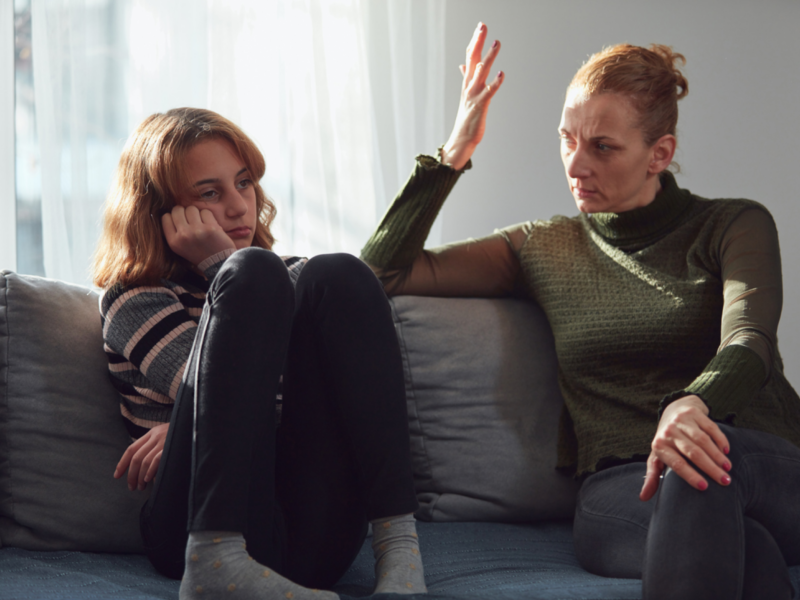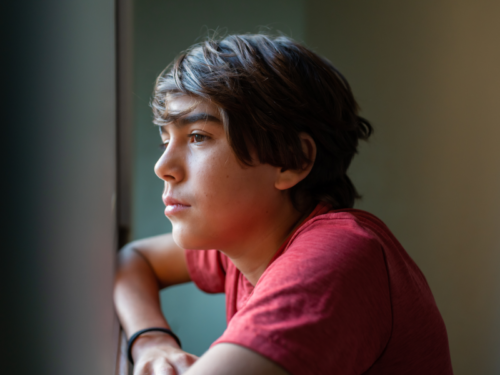
Table of Contents
Emotionally Abusive Parents Take a Toll on Your Mental Health

Written By: Ethan Cohen BSN, RN

Clinically Reviewed By: Dr. Don Gasparini
November 17, 2023
6 min.
Growing up with emotionally abusive parents can have an immediate and long-term negative impact on a person's emotional, mental, and physical well-being. Learn more here.
Learn more about our Clinical Review Process
Table of Contents
If you or someone you know is experiencing any type of abuse, call the National Domestic Violence Hotline at 1-800-799-7233 (SAFE) or 1-800-787-3224 (TTY) for anonymous, confidential help available 24/7.
Growing up, home is meant to be a safe, secure, and nurturing space where parents protect children—emotionally, intellectually, and physically. Sadly, this ideal isn’t always the reality, and it’s far too common for children to endure emotional abuse from their parents. The Centers for Disease Control and Prevention estimates that at least one in seven children in the United States experienced child abuse or neglect in the past year.
Parental emotional abuse, also known as psychological abuse, is a harmful pattern of abusive behavior inflicted by a parent or guardian on a young person. These behaviors come in various forms and damage a child’s emotional development and self-worth, leading to severe mental, emotional, and physical health consequences in the immediate and long-term. Keep reading to learn more about what emotional abuse from parents may look like and how to heal from the effects of emotionally abusive parents.

Healing from childhood abuse is possible
Charlie Health offers trauma-informed virtual care for survivors.
What is emotional abuse from parents?
As mentioned earlier, emotional abuse by parents involves verbal or behavioral actions that jeopardize a child’s sense of self-worth and safety—both emotionally and physically. Emotionally abusive parenting puts a child at immediate risk and can lead to negative mental, emotional, and physical consequences that often persist for years.
Emotional childhood abuse is categorized as an adverse childhood experience (ACE). ACEs are potentially traumatizing events in childhood, and research has linked them to chronic health problems, mental illness, and substance use issues in adolescence and adulthood. Childhood emotional abuse by a parent can also strain a person’s ability to maintain healthy relationships later in life. It can make a child feel flawed, unloved, unwanted, endangered, or valued only to meet someone else’s needs.
If the information above sounds familiar to you—either because of how your parents are treating you now or how you were treated as a child—it’s important to reach out for help. If you are experiencing any type of abuse right now, call 911 or contact the National Domestic Violence Hotline at 1-800-799-7233. If past experiences of abuse from a parent or guardian continue to impact your well-being today, consider working with a licensed mental health professional to process past traumas and learn how to build healthier relationships.
Types of emotional abuse by parents
Emotional abuse involves a range of harmful behaviors that can profoundly impact a child or young adult’s mental health. Unlike physical abuse, emotional abuse is insidious and may go unnoticed by others. However, it may also go hand-in-hand with other kinds of abuse, including physical abuse or neglect. Here are some examples of what emotional abuse by parents may look like:
- The use of harsh language, insults, or demeaning comments that inflict emotional pain (e.g., name-calling)
- Tactics to try and control and manipulate a child’s thoughts, emotions, or behaviors
- Dismissing or belittling a child’s emotions
- Failing to recognize or respond to a child’s emotional needs
- Providing love and approval only under specific conditions
- Making threats
Factors contributing to emotional abuse
Emotional abuse can affect any child, regardless of their background. However, certain circumstances can elevate the risk of a child experiencing emotional abuse by a parent or guardian.
Past research focused largely on individual and interpersonal risk factors, concluding that race, ethnicity, and material family hardships put children at a higher risk for emotional abuse. However, a recent literature review concluded that structural and systemic factors (like racism) contributed to these findings more so than inherent risk. Instead, the review found that community and societal-level risk factors, like regressive taxes, inequity, and concentrated neighborhood disadvantage, can elevate the risks of a child experiencing parental emotional abuse. This finding suggests that interventions at these levels would be more effective in preventing childhood abuse.
Signs of emotional abuse
Understanding whether a child is experiencing emotional abuse by a parent or guardian is crucial for timely intervention and support. Awareness of the signs and symptoms of emotional abuse not only protects children from present abuse but can also offer insight into the lasting effects of childhood abuse by parents on survivors. According to the Child Welfare Information Gateway, a national source of information on child welfare topics, there are several key signs that a child may be undergoing emotional abuse:
- Displaying extremes in behavior, ranging from excessive compliance to demanding behavior, or oscillating between overly adult-like actions (e.g., parenting other children) and inappropriately infantile behaviors (e.g., frequent rocking or head-banging).
- Exhibiting delays in both physical and emotional development.
- Demonstrating signs of depression or expressing suicidal thoughts.
- Reporting an inability to form emotional bonds with others.
Long-term effects of childhood abuse
Childhood abuse by parents can cause long-lasting negative effects on an individual’s life, influencing various aspects of their mental, emotional, and physical health. Understanding these enduring effects is essential for both survivors of childhood abuse and those aiming to support them. Below is a list of some of the ways the experience of abuse by a parent or guardian in childhood can affect people later in life:
Attachment issues
People who experienced abuse in childhood may struggle to form secure, trusting attachments with others. This can affect their ability to establish and maintain healthy relationships throughout their life. Survivors may encounter difficulties with intimacy and trust into adulthood, leading them to struggle with opening up emotionally or with forming close connections with others.
Mental health challenges
Research indicates that childhood abuse can be linked to an increased risk of developing depression and anxiety disorders in adulthood. The emotional scars left by abuse can contribute to persistent feelings of sadness, hopelessness, and heightened anxiety that severely affects someone years after the initial abuse. Also, some survivors may experience symptoms of post-traumatic stress disorder (PTSD) or complex post-traumatic stress disorder (C-PTSD), including flashbacks, nightmares, hypervigilance, and dissociative symptoms as a result of the traumatic experiences endured in childhood.
Self-esteem and identity issues
Childhood abuse can profoundly impact self-worth, leading to persistent feelings of inadequacy and low self-esteem. Survivors may also grapple with identity issues, as the abuse may have distorted their sense of self and hindered the development of a positive self-concept.

Negative coping mechanisms
In an attempt to cope with the long-lasting emotional pain of the abuse, survivors may develop maladaptive coping mechanisms, such as substance abuse or self-harming behaviors. This can manifest through various behaviors that can endanger the individual.
Physical health consequences
Research indicates a correlation between childhood abuse and an increased risk of developing chronic health conditions later in life. Specifically, this research demonstrated the connection between childhood trauma exposure, high-risk behaviors (e.g., smoking, unprotected sex), chronic illnesses such as heart disease and cancer, and early death.
Healing from emotional abuse with Charlie Health
Whether you are currently struggling in an abusive home environment or have been the victim of child abuse by a parent or guardian in the past, Charlie Health is here to help.
Our virtual Intensive Outpatient Program (IOP) provides more than once-weekly personalized mental health services for young people and families dealing with complex mental health conditions, including trauma and abuse. Charlie Health’s clinicians are trauma-informed and well-equipped to help you process emotional trauma in non-judgemental group sessions, individual counseling, and family therapy.
Fill out this form to start your journey towards a safer and more secure future today.
References
https://americanspcc.org/emotional-child-abuse/
https://www.verywellfamily.com/what-is-emotional-child-abuse-4157502
https://www.ncbi.nlm.nih.gov/pmc/articles/PMC2671800/
https://www.ncbi.nlm.nih.gov/pmc/articles/PMC3998989/
https://www.childwelfare.gov/topics/safety-and-risk/emotional-abuse/
https://www.healthyplace.com/abuse/child-psychological-abuse/what-is-psychological-abuse-of-a-child
https://imprintnews.org/featured/emotional-abuse-is-inadequately-defined-and-measured
https://www.cdc.gov/violenceprevention/aces/fastfact.html
https://www.verywellfamily.com/unreported-early-abuse-impacts-adulthood-5095726




